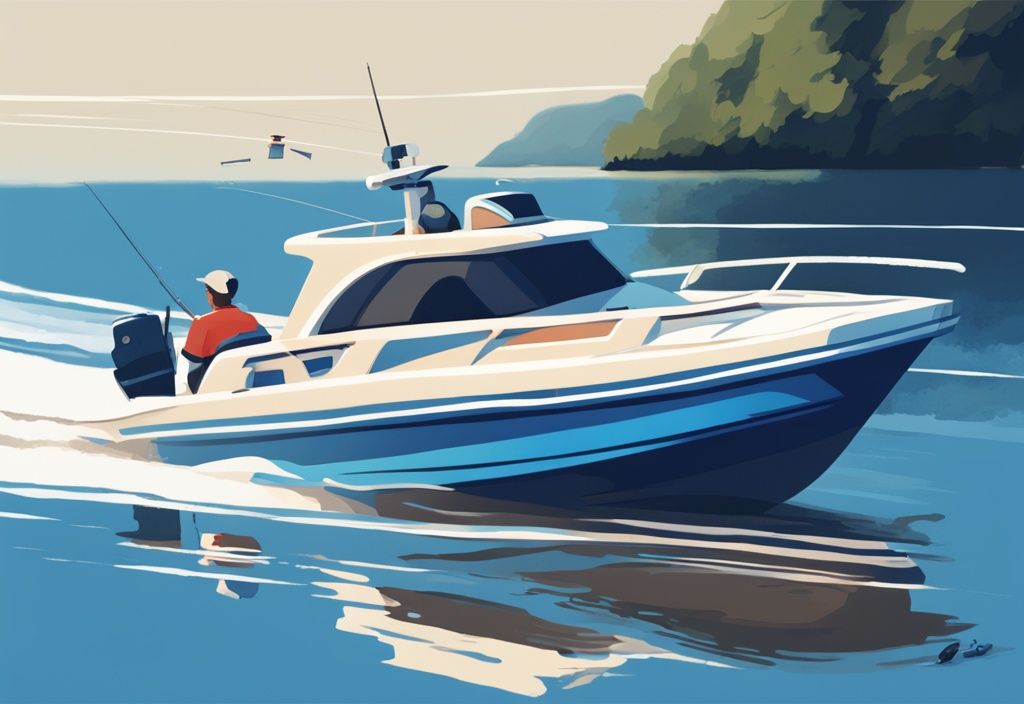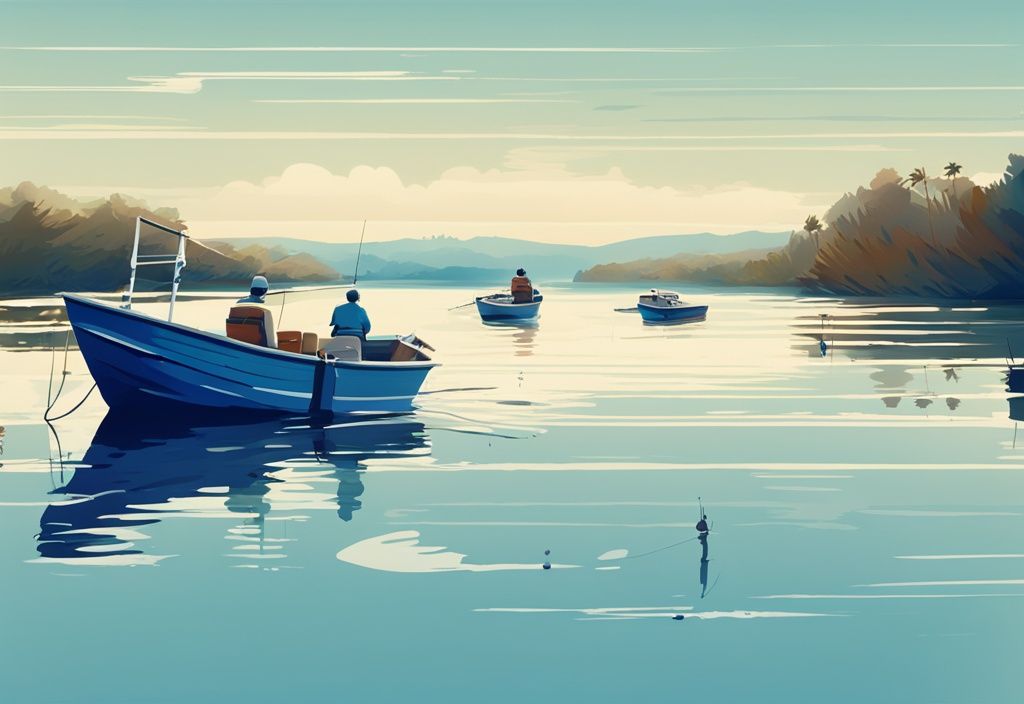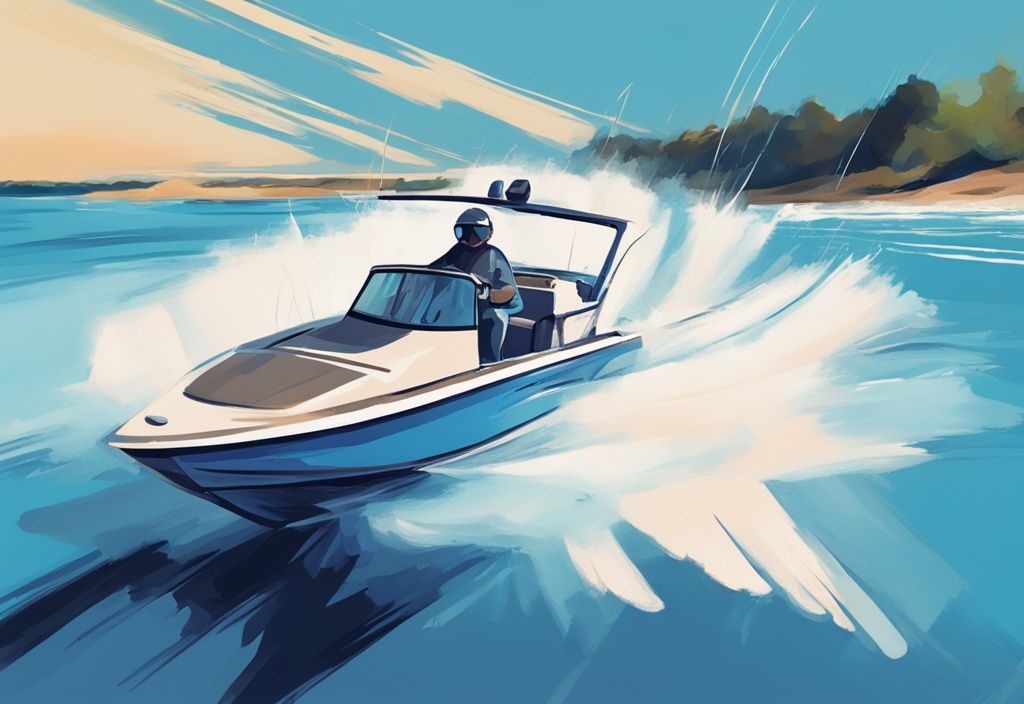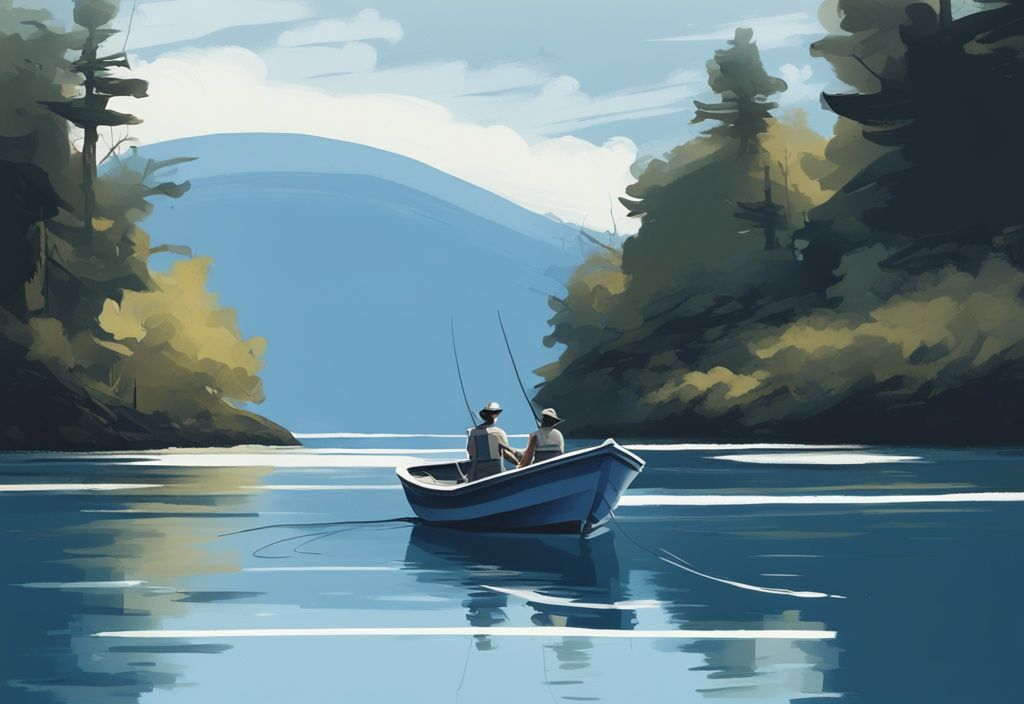Ever wondered why it’s crucial for boaters to slow down while cruising past recreational fishing boats? Well mateys, there’s more to this tale than meets the eye! As a seasoned fisherman, I can tell you it’s not just about courtesy; it’s a vital measure for everyone’s safety on the water and the overall fishing experience.
Whizzing by can create dangerous wakes, disrupt fishing activities, and potentially damage pricey gear. Believe me, I’ve seen it happen more times than I’d like to recall. What’s more, showing a little respect to fellow anglers enhances the overall boating atmosphere.
So, hold tight and dive with me into this sea of knowledge as we explore why reducing speed is pivotal for ensuring safe and enjoyable escapades on the water. Ready to set sail?
The Importance of Safe Boating Practices Near Fishing Boats
Slowing down while passing recreational fishing boats is a key element of safe boating practices. Let’s dive into why this is so important.
Understanding Boating Etiquette When Sharing Water with Fishermen
When you’re out on the water navigating near fishing boats, easing back on the throttle is more than just a courtesy—it’s essential. Fishing vessels often remain stationary or move at a snail’s pace, with anglers engrossed in their lines and less aware of surrounding traffic. Charging through at high speed can create waves strong enough to tangle or even snap fishing lines. By slowing down, your wakes become gentler, ensuring that the fishermen can continue their activity undisturbed.
Another thing to watch out for is boats engaged in trolling. These boats have multiple lines trailing behind them like a peacock’s tail. When other boaters reduce their speed, it makes it far less likely those delicate lines will get snarled in props or each other. Plus, managing your boat at a slower speed boosts maneuvering precision, helping you avoid crisscrossing over those lines and causing a mess that even the most patient fishermen would find exasperating.
Above all, showing mutual respect on the water promotes a harmonious and safe environment. Whether you’re reeling in a big catch or simply enjoying a leisurely cruise, adhering to considerate boating practices ensures everyone can make the most of their time on the water, free from unnecessary disruptions or risks. It’s this kind of respectful behavior that fosters a positive community atmosphere for all.
Regulation Requirements for Boating Near Fishing Boats
Now let’s talk regulations. Boating near fishing boats is governed by specific rules that differ by region but commonly include speed and conduct mandates. In many places, you’re legally required to slow down when passing fishing boats to avoid creating hazards, as outlined in Florida’s boating laws available at https://myfwc.com/boating/regulations/. Sticking to these rules isn’t just about abiding by the law—it’s about doing what’s right.
Why’s that? Slowing down enhances safety, creating a more pleasant atmosphere for everyone. When you comply with these regulations, you contribute to a responsible and tight-knit boating community. Plus, there’s a bonus: reducing speed cuts down on noise and water disturbance. Some fish are shy and more likely to bite when it’s quiet, so slowing your boat can actually improve fishing success rates.
In the end, slowing down while passing recreational fishing boats not only fosters safety but also showcases responsible and considerate behavior. It’s all about promoting a better experience for everyone sharing the water.
Risks You Sidestep by Slowing Down Near Fishing Boats
How Speed Affects Risk of Collisions
Imagine barreling through a tranquil fishing area, your boat slicing the water at high speed. Sounds exhilarating, right? But it’s not just fish that might scatter – so do the chances of a peaceful fishing day. A high-speed pass near recreational fishing boats can create sudden, dangerous situations for everyone on the water.

You see, slowing down gives everyone, including you, more time to react. When you keep your speed in check, you significantly lower the risk of collisions.
Even more importantly, zooming past fishing lines could lead to tangled or snapped lines, much to the frustration of any angler nearby. You know how it goes—hours of patience, and then a fast boat ruins the setup. Slower boats have much better control, allowing you to navigate around fishing zones without crossing those lines, literally and figuratively.
And let’s talk about focus. A roaring engine can jolt anyone out of their fishing zen, increasing the risk of personal injuries or mishaps. By easing off the throttle, you create a safer environment for anglers to stay concentrated on the catch of the day.
The Hidden Danger: Wake-Induced Instability
Now, another sneaky risk comes into play – the wake from your boat. If you’re speeding through, that wake creates a wave of trouble. The rocking and instability it causes can lead to a chain reaction of risks. Think about it: one moment, a fishing boat is sitting steady; the next, it’s being tossed like a cork because a fast boat just sped by.
This isn’t just uncomfortable; it can turn dangerous. From equipment going overboard to crew members losing balance, the potential for accidents ramps up quickly. Man-overboard situations or even direct collisions become real possibilities. By keeping your speed down, you reduce the size of your wake, making the water less choppy for everyone.
In fishing, as in life, a little courtesy goes a long way. By slowing down, you help maintain stability, making the water safer for all. It’s not just about avoiding tangled lines and collisions; it’s about ensuring everyone enjoys their day out, free from unnecessary risks. Now, doesn’t that sound like a better day on the water?
Boating Speed’s Impact on the Fishing Experience
How Speed Can Disturb Fishing Lines and Bait
Ever found yourself blissfully casting a line, only to have a boat zoom past, leaving chaos in its wake? High-speed boating isn’t just a nuisance; it can seriously mess with your fishing game. Picture this: a speeding boat rockets by, churning up waves that tangle fishing lines and scatter bait. It’s frustrating, right? Not only does it disrupt your focus, but it can also spook the fish, turning a promising session into a total bust.
By easing up on the throttle, boaters give us anglers the grace period we need to manage our lines. Slower speeds mean fewer tangles and more fish-friendly waters. And here’s a pro tip: shift that engine to neutral when passing by. This move allows our lines to sink safely beneath your boat, preventing any unpleasant entanglements and keeping the peace on the water.
Do Boats Scare Away Fish? The Truth Explained
Now, about the fish – they’re like underwater ninjas, easily startled by excessive noise and vibration. Boats cruising at high speeds create quite a racket, making the waters anything but serene. Fish are hyper-aware of these disturbances, and many species tend to scatter when the water gets too riled up. It’s like trying to catch a nap in the middle of a construction site—no one’s sticking around for that.
By slowing down, boaters not only respect the angler’s space; they ensure a quieter, more inviting environment for fish. This tranquility encourages natural fish behavior, leading to more bites and a richer fishing experience. Plus, keeping things calm helps preserve the delicate balance of their habitats, ensuring these fishing spots remain bountiful.
So, next time you’re out on the water, remember: slower is better, for both the anglers and the fish. It’s a win-win, creating a more enjoyable and productive day for everyone involved.
Let’s Dive Into the Consequences: Environmental Implications
When we’re out on the water, it’s not just about the catch—it’s also about preserving the beauty and balance of our aquatic playground. Let’s take a closer look at how our boating habits, particularly our speed, can impact the environment.
Boating Speed and Its Influence on Shoreline Erosion
Ever noticed how a speeding boat sends waves crashing against the shore? High-speed passes near the shoreline or in shallow waters can cause significant erosion. This process destabilizes the shoreline, leading to the loss of habitats crucial for various marine life. The constant agitation from fast-moving boats disrupts the natural sedimentation process, causing increased turbidity in the water and negatively impacting water quality.
Furthermore, the sudden and intense wave action can disturb delicate ecosystems. Marine creatures get spooked and might have to relocate, reducing the fish population and undermining the health of the aquatic environment. A slow pass near the shore allows sediments to settle naturally, helping to preserve the integrity of the shoreline. This ensures that habitats remain stable for the creatures that depend on them.
Steps to Minimize Damage to the Marine Ecosystem
One of the simplest ways we can protect marine ecosystems is by slowing down near fishing areas. Reduced speeds enhance boating precision, making it easier to navigate without crossing fishing lines or harming the environment. This careful maneuvering helps avoid incidental damage to underwater vegetation and reduces the risk of propeller strikes, which can injure aquatic life.
By slowing down, we avoid kicking up sediment into the water column, maintaining better water clarity and quality. Clear water is essential for photosynthesis by aquatic plants, which in turn supports a healthy food web. Abiding by established marine regulations and promoting ethical boating not only protects marine habitats but also contributes to a sustainable and flourishing aquatic environment. This way, both the recreational fishing and boating communities can thrive.

So, the next time you’re cruising past a fishing boat, remember: slowing down is a win-win for everyone—especially the fish beneath the surface.
Fostering Respect and Community on the Water
The Role of Cooperative Boating
Why should boaters slow down while passing recreational fishing boats? Imagine you’re casting your line on a serene morning, the sun’s rays just beginning to dance on the water. Suddenly, a speeding boat races by, disrupting the peace and causing your carefully laid lines to tangle. Frustrating, right? Slowing down is a sign of respect and consideration for fellow anglers, fostering a positive and cooperative atmosphere on the water. When boaters take it slow, they acknowledge the presence and efforts of those fishing, leading to a harmonious environment where everyone can enjoy their time without worries.
Reducing speed isn’t just about courtesy—it’s a critical safety measure. Slower speeds mean decreased risks of collisions and less wake-induced instability. For those interested in enhancing their fishing experience, explore our 10 best fishing sling packs to find the perfect gear for your needs. This ensures the safety of everyone, from novice boaters to seasoned anglers. Plus, it allows fishing enthusiasts to manage their lines more effectively, avoiding tangles and disruptions. Ultimately, this collective effort to maintain low speeds near fishing boats promotes mutual respect and enhances the overall aquatic experience for all.
A Guide to Legal and Ethical Boating Practices
Understanding the rules and ethics of boating is crucial, buddy. Just because you’ve got several lines out on your trolling boat doesn’t grant you right-of-way status. The rules of the water still apply, no matter your activity. For instance, a sailboat under sail always has the right of way over powerboats. By slowing down, you avoid unnecessary conflicts and ensure smoother navigation. Knowing these fundamentals helps prevent misunderstandings and potential accidents, keeping the water a safe and enjoyable place for everyone.
In any situation where right-of-way isn’t crystal clear, slowing down or making a wide circle to allow the other boat to pass safely is the savvy move. It’s all about demonstrating a commitment to safety and respect among all waterway users. Following these principles is not just a legal requirement but an ethical one. It shows your dedication to maintaining a safe and enjoyable environment for everyone on the water.
Practical Ways to Slow Down While Passing Fishing Boats
Navigating waters shared with recreational fishing boats calls for some thoughtful behaviors that ensure safety for everyone. This section covers essential techniques and tips to maintain a slower speed around fishing boats.
Top Safety Tips for Passing Fishing Boats
When you’re out on the water, slowing down near recreational fishing boats is more than just courteous—it’s crucial. Reducing speed helps avoid creating those annoying wakes that can mess with fishing lines and cause disturbances on board. This simple act ensures a peaceful and secure passage for everyone.
One effective technique is to shift your engine to neutral as you approach a fishing boat. Doing this allows fishing lines to sink, safely clearing your propeller and reducing the risk of entanglement. Trolling boats, in particular, often deploy multiple lines, and lowering your speed provides the boats with the time and space needed for these lines to pass without getting caught.
Additionally, slowing down makes your boat more maneuverable, which is especially important in crowded fishing areas. It allows for precise adjustments in direction and speed, minimizing the risk of crossing over fishing lines and causing snarls or tangles. Ultimately, slowing down fosters mutual safety and respect among all watercraft operators.
How to Avoid Fishing Lines While Maneuvering
Navigating waters with fishing boats demands careful attention and the right techniques. By passing at a slower speed, you give anglers the time they need to manage their lines, preventing them from snagging on your boat.
At reduced speeds, you gain finer control over your boat’s movements. This makes it easier to steer clear of fishing lines and avoid tangling them. Reduced speed enhances the safety of your boat and protects the fisherman’s lines, ensuring no lines get caught in your propeller or disrupted by your wake.
Additionally, maintaining a sharp awareness of your surroundings is crucial. Always keep an eye out for fishing boats and steer clear of areas where anglers are actively fishing. This proactive approach not only prevents accidents but also creates a more enjoyable and respectful experience on the water for everyone involved.
By incorporating these practices into your boating routine, you contribute to a safer and more harmonious environment on the water, benefiting both recreational boaters and fishermen.
Discovering the Economic Angle of Safe Boating
When it comes to the economics of boating, there are several factors to consider. From protecting your gear to cutting down on fuel costs, slowing down when you pass recreational fishing boats has its perks. Let’s dive into why taking it easy on the throttle is beneficial, shall we?

Safeguarding Your Boat and Fishing Gear
Slowing down while passing recreational fishing boats is essential for protecting valuable fishing gear. Fast waves created by high-speed boats can severely damage lines, rods, and other equipment, leading to costly replacements or repairs. Imagine the frustration of having to replace a favorite rod because a boat zipped by too quickly.
Additionally, a slower approach minimizes the risk of collisions, safeguarding both the fishing and recreational boats from damage. This proactive measure ensures that boaters avoid unnecessary expenses, preserving their investments and maintaining the safety of those onboard.
Operating at reduced speeds not only decreases the potential for accidents but also shows respect for the fishing community. By maintaining a considerate pace, boaters contribute to a safer environment, allowing for uninterrupted fishing activities. This practice benefits everyone involved, as it prevents unintentional damage to fishing gear and promotes a harmonious coexistence on the water.
Fuel Consumption: The Cost-Efficiency Aspect
Another compelling reason why boaters should slow down while passing recreational fishing boats involves fuel efficiency. Boats running at slower speeds consume less fuel, translating to substantial cost savings over time. This is especially beneficial for those who spend significant amounts of time on the water, reducing the frequency of refueling stops and lowering overall operational costs.
Moreover, reduced fuel consumption has positive environmental impacts. By operating more efficiently, boaters minimize their carbon footprint, contributing to the preservation of marine ecosystems. It’s a win-win scenario, where boaters save money while also promoting environmentally friendly practices.
Thus, by adopting a slower pace near fishing boats, you not only enhance your economic standing but also play a part in sustaining the delicate balance of aquatic life.
FAQs: Your Leading Questions Answered
Why is it necessary to slow down near fishing boats?
Slowing down near fishing boats is paramount for the comfort and safety of everyone involved. Ever felt the jolt of a big wake? Trust me, it’s not fun when you’re trying to enjoy a peaceful day on the water. Reducing speed diminishes the risk of collisions and prevents wake-induced instability that could send someone overboard. Plus, it keeps fishing lines undisturbed and compliant with many local regulations. Safety first, folks!
What are the hidden dangers of high-speed passes near fishing boats?
High-speed passes are like a bull in a china shop—chaos waiting to happen. A sudden wake can cause unstable conditions, tipping over smaller boats or causing man-overboard situations. Your fast pass can also mess up fishing lines, scare off the fish, and disperse bait. Imagine spending hours on a well-planned fishing trip only to have your lines disrupted in an instant. Not cool, right?
Can a boat’s speed impact the marine environment?
Yes, absolutely. When boats zip by too fast, they can cause shoreline erosion and disturb delicate marine habitats. Fast movements scatter fish and disrupt their natural habitat. Slowing down isn’t just about safety; it’s about respecting the marine environment and keeping it healthy for future trips. Ever seen erosion up close? It’s like watching a favorite fishing spot get ruined over time.
Are there any laws stating the speed limit near fishing boats?
In many locales, you’re legally required to slow down around fishing boats to avoid potential hazards. Specific rules are in place for how you should navigate near fishing vessels, especially in narrow channels or along the coast. It’s essential to know and follow these regulations, or you could end up facing fines—or worse, putting people in danger. Nobody wants a citation ruining their fishing trip.
What are the best strategies for safe boating near fishing boats?
Here are some foolproof strategies: Slow down to minimize wake and avoid rocking fishing boats or tangling lines. Shift your engine to neutral as you pass by, allowing fishing lines to clear safely. Always stay alert and aware of your surroundings, avoiding areas where boats are actively fishing. These tips ensure not just your safety, but the safety and enjoyment of fellow anglers. It’s all about sharing the water responsibly.
Conclusion
Slowing down while passing recreational fishing boats is crucial for everyone’s safety. Trust me, I’ve spent over two decades out on the water, and high-speed passes can cause major wake-induced instability. Imagine the chaos when those wakes hit a stationary or slow-moving fishing boat—accidents, man-overboard situations, or even collisions can happen. By easing off the throttle, you can finesse your way around these boats, steering clear of tangled fishing lines and potential hazards.
Moreover, respecting the fishing process matters. Picture this: you’re patiently waiting for a bite, but a speeding boat scares away all the fish. Frustrating, isn’t it? When you slow down, it gives anglers enough time to manage their lines and navigate safely. Not to mention, it keeps the fish biting and makes for a more enjoyable day on the water.
Slower speeds also benefit the marine environment. Zipping past shorelines at high speed isn’t just reckless; it contributes to erosion and messes with vital habitats. By cutting down on your speed, you’re helping to minimize sediment stirring and water contamination, keeping the ecosystem healthy and thriving.
And let’s not forget the community spirit on the water. Mutual respect among boaters fosters a positive atmosphere. A slower pass shows you’re considerate and committed to a serene, enjoyable environment. After all, we’re all out there to enjoy ourselves, and cooperation makes for a better experience for everyone.
So, next time you’re out boating, remember: slowing down isn’t just a good practice—it’s essential. It ensures safety, respects the fishing process, preserves the environment, and builds a supportive boating community. Keep these points in mind, and you’ll contribute to a sustainable and enjoyable time on the water for all.


